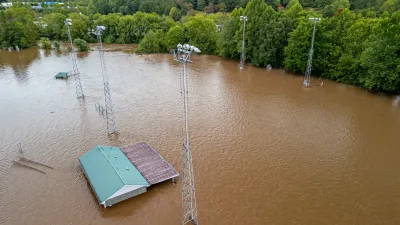It all depends on who you ask, argues David Alpert. Ratepayers have pushed for buried lines before; now, there's reason to doubt it would cost as much as the utility company once quoted them.
Three days after a storm took out power lines across the region, residents throughout D.C., Maryland, and Virginia are still stranded without electricity – and determined to make sure a little bad weather never leaves them in the dark again.
But ratepayers have raised the issue of buried power lines with the Potomac Electric Power Company (or Pepco, for short) before, when the D.C. Department of Transportation rebuilt a one-mile stretch of Brookland's 12th Street just three years ago. At the time, Pepco quoted the cost of burying power lines on 12th at $60 million. Yet when residents looked to other jurisdictions that were doing the same thing, they found costs estimated at "$500,000 to $3 million per mile," Alpert notes. "That means the estimates differ by a factor of 20 to 120."
"This reveals a credibility gap for Pepco. The utility
wasn't really interested in putting lines underground, so it seems it
threw out a very high estimate."
While moving those lines underground would have saved one neighborhood from the blackout, Pepco would have to bury its main trunk lines to protect the region at large – which, with a couple small exceptions, it has expressed little interest in doing.
"One thing is clear," Alpert charges: "unless the PSC starts pushing Pepco hard, wires
won't go underground. To the utility, there's no incentive to invest in
the cost of expensive infrastructure that's more reliable, or just
having more crews on hand to make repairs. As a for-profit company with
fixed rates, their only incentive is to keep costs low, and that means
skimping on reliability."
FULL STORY: What will it cost to bury power lines?

Planetizen Federal Action Tracker
A weekly monitor of how Trump’s orders and actions are impacting planners and planning in America.

Restaurant Patios Were a Pandemic Win — Why Were They so Hard to Keep?
Social distancing requirements and changes in travel patterns prompted cities to pilot new uses for street and sidewalk space. Then it got complicated.

Map: Where Senate Republicans Want to Sell Your Public Lands
For public land advocates, the Senate Republicans’ proposal to sell millions of acres of public land in the West is “the biggest fight of their careers.”

Maui's Vacation Rental Debate Turns Ugly
Verbal attacks, misinformation campaigns and fistfights plague a high-stakes debate to convert thousands of vacation rentals into long-term housing.

San Francisco Suspends Traffic Calming Amidst Record Deaths
Citing “a challenging fiscal landscape,” the city will cease the program on the heels of 42 traffic deaths, including 24 pedestrians.

California Homeless Arrests, Citations Spike After Ruling
An investigation reveals that anti-homeless actions increased up to 500% after Grants Pass v. Johnson — even in cities claiming no policy change.
Urban Design for Planners 1: Software Tools
This six-course series explores essential urban design concepts using open source software and equips planners with the tools they need to participate fully in the urban design process.
Planning for Universal Design
Learn the tools for implementing Universal Design in planning regulations.
Heyer Gruel & Associates PA
JM Goldson LLC
Custer County Colorado
City of Camden Redevelopment Agency
City of Astoria
Transportation Research & Education Center (TREC) at Portland State University
Camden Redevelopment Agency
City of Claremont
Municipality of Princeton (NJ)





























